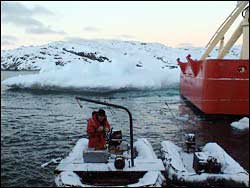
A study of fossils from the Paleozoic Era, collected across the world, reveals that ancient brachiopods were little bothered by predators. However, the rare predation traces left on brachiopod shells by unknown assailants coupled with a subtle increase in their frequency through time may be the shadows on the wall that show killers were in the room and their numbers increased with time.
From 550 million years ago until 250 million years ago, brachiopods, or “lampshells,” were pl
Warmer oceans, more moisture in the atmosphere, and other factors suggest that human-induced climate change will increase hurricane intensity and rainfall, according to climate expert Kevin Trenberth of the National Center for Atmospheric Research. His paper, “Uncertainty in Hurricanes and Global Warming,” appears in the Perspectives section of the June 17 issue of Science.
“Trends in human-influenced environmental changes are now evident in hurricane regions,” says Trenberth. “Th
European challenges for hydrodynamic modelling in coastal and shelf seas is the focus of the latest report from the European Science Foundation (ESF) Marine Board, released on 6 June at the fourth annual EuroGOOS (Global Ocean Observing System) conference in Brest, France.
Produced by a Marine Board Working Group, chaired by Dr. David Prandle of the Proudman Oceanographic Laboratory in Liverpool, England, the report presents the latest findings from this Group which concentrates
This release from the University of Oxford has been forwarded for your information by Peter Bond, RAS communications officer. Forwarding does not imply endorsement by the RAS.
University of Oxford Press Release
Astrophysicists from the Universities of Oxford and Rome have for the first time found evidence of ripples in the Universe’s primordial sea of neutrinos, confirming the predictions of both Big Bang theory and the Standard Model of particle physics.
Neutrinos are el

Findings show that ice fracturing occurs in episodes and may be tied to changes evolving over seasons
A multifaceted research effort by scientists at Scripps Institution of Oceanography at the University of California, San Diego, and their international colleagues from the University of Tasmania and the Australian Antarctic Division, has resulted in several important new findings about Antarctica and the changing dynamics of its ice structure.
Scientists have been

Reveal Hidden Dangers to Passing Ships
Using inflatable boats, a portable depth sounder with GPS, and a REMUS autonomous underwater vehicle, a team of scientists and engineers has created the first detailed, comprehensive chart of the ocean floor around Palmer Station in Antarctica, revealing previously unknown submerged rocks.
The new chart, the first in 50 years, was made by a research team from the Woods Hole Oceanographic Institution (WHOI) and the University of